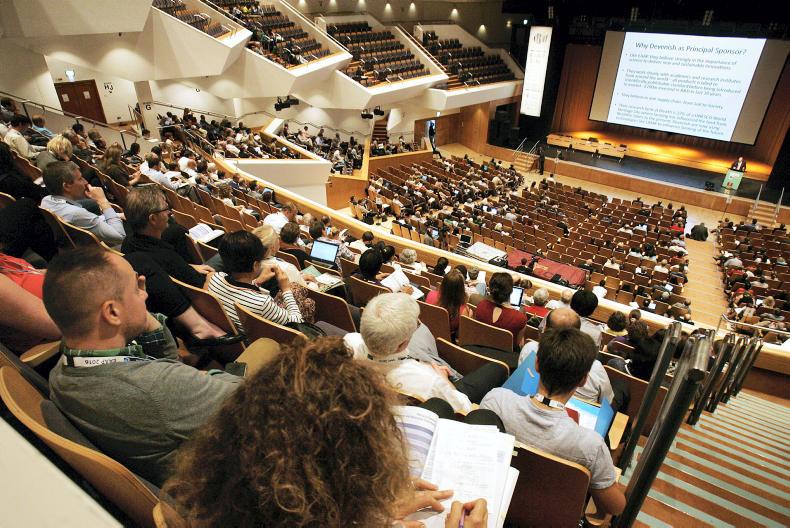Reducing livestock’s contribution to greenhouse gas emissions and the industry’s contribution to climate change is a theme of several presentation sessions at the European Federation of Animal Science (EAAP) conference
Speaking to the Irish Farmers Journal after chairing a session on the links between livestock genetics and methane emissions, Professor Eileen Wall said that by breeding for efficiency in livestock systems, farmers continue to breed for reduced methane emissions from the livestock sector.
Listen to a podcast with Professor Wall here:
Taking this further, she said that scientists are studying how the genetics of ruminants can directly relate to methane emissions. Professor Wall said that studies have shown there is heritability in ruminants to methane emissions and that this could be developed to eventually select lower methane-emitting animals.
Carrying out this research also presents difficulties, such as collecting data from large populations and under commercial farming conditions. Speakers in the session agreed that scarcely measured traits are complicated to evaluate and base a breeding programme on.
Originally, methane emissions were only measured in respiratory chambers in indoor research facilities. However, Professor Wall said that new technologies are continually being developed to record methane emissions in conditions more common to ordinary farms. These include infrared technologies that can be placed in feeding passages or in milking parlours.
Further reports from the EAAP conference will feature on www.farmersjournal.ie and in next week’s edition of the Irish Farmers Journal.
Read more
NI science takes the centre stage
Over 1,500 attend Belfast livestock conference
Reducing livestock’s contribution to greenhouse gas emissions and the industry’s contribution to climate change is a theme of several presentation sessions at the European Federation of Animal Science (EAAP) conference
Speaking to the Irish Farmers Journal after chairing a session on the links between livestock genetics and methane emissions, Professor Eileen Wall said that by breeding for efficiency in livestock systems, farmers continue to breed for reduced methane emissions from the livestock sector.
Listen to a podcast with Professor Wall here:
Taking this further, she said that scientists are studying how the genetics of ruminants can directly relate to methane emissions. Professor Wall said that studies have shown there is heritability in ruminants to methane emissions and that this could be developed to eventually select lower methane-emitting animals.
Carrying out this research also presents difficulties, such as collecting data from large populations and under commercial farming conditions. Speakers in the session agreed that scarcely measured traits are complicated to evaluate and base a breeding programme on.
Originally, methane emissions were only measured in respiratory chambers in indoor research facilities. However, Professor Wall said that new technologies are continually being developed to record methane emissions in conditions more common to ordinary farms. These include infrared technologies that can be placed in feeding passages or in milking parlours.
Further reports from the EAAP conference will feature on www.farmersjournal.ie and in next week’s edition of the Irish Farmers Journal.
Read more
NI science takes the centre stage
Over 1,500 attend Belfast livestock conference






 This is a subscriber-only article
This is a subscriber-only article









SHARING OPTIONS: